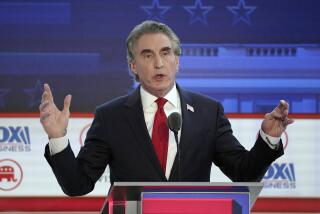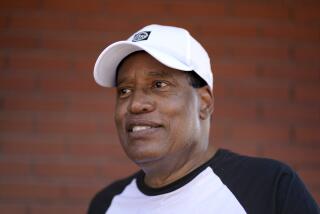A Whole New Ballgame in Illinois
- Share via
CHICAGO — The world of Illinois politics was Jim Edgar’s oyster. Wherever he looked, opportunities lay. The popular two-term Republican governor could have prepared for an expected easy waltz into office for a third time next year. Or he could have challenged Democratic Sen. Carol Moseley-Braun, who has been perpetually troubled by questions of judgment since her 1992 election.
Instead, Edgar, 51, left the state’s political establishment gasping last month by informing them that he has had his fill of elective life. In the few short weeks since Edgar’s announcement that he will retire from public office when his term expires in January 1999, gubernatorial and senatorial hopefuls from both parties have come out into the open.
One day recently, Secretary of State George Ryan, Edgar’s handpicked heir, declared his candidacy for the GOP nomination. The next day, former Democratic Atty. Gen. Roland Burris said he would go for his party’s nod.
“They’re falling over themselves to get their names out there, and with good reason,” said Paul Green, professor of political science at Governor’s State University. “None of them are named Jim.”
Edgar has long been a popular Republican leader in a state that has consistently elected and reelected GOP stalwarts since 1972. His latest polls showed he has maintained a popularity rating hovering close to 70%--even after a federal jury convicted one of his most reliable campaign donors and a former state welfare official on fraud and bribery charges.
Some observers suggested that the trial-- highlighted by Edgar’s uncomfortable testimony-- might have given his opponents ammunition. But Edgar said Aug. 21 that he was giving up after 30 years in Illinois politics because “if you don’t go out on top, they throw you out.” As a caveat, he added, “I didn’t think I was going to get thrown out.”
Although Edgar’s bowing out gives Democrats a shot at the statehouse that they otherwise would have consigned to a sure loser, the weight of recent electoral history is against them. Illinois voters have chosen Republican governors for the last quarter-century, largely because the party’s candidates all have hewed to a moderate course.
The state is predisposed toward electing Republicans--Chicago’s powerful Democrat-leaning voting bloc can always be overcome by the GOP’s ever-strengthening edge downstate and in suburban Chicago enclaves known as the “collar counties.” Only Democratic centrists like Bill Clinton--who has twice won converts among suburban voters--and southern Illinois Democratic figures like Paul Simon and Alan Dixon have traditionally fared well in statewide races.
“The bottom line,” says Green, “is whether they can they hold Chicago and go into the suburbs.”
Ryan, the likely Republican nominee, has cultivated an image as a conservative who gets along with prominent Democrats as well as his own colleagues. Ryan, who has amassed a formidable $2.5-million campaign chest, is known to kibitz at Democratic Party affairs and has delivered state funding to Chicago when Edgar and other GOP legislators have balked. That role has endeared Ryan to Chicago Mayor Richard M. Daley to the extent that some observers wonder if Daley might sit on the sidelines and quietly root for Ryan if the Democrats fail to nominate a candidate he prefers.
The Democratic side is still shaking out. Already running is a former Daley aide, John Schmidt, who was the third-ranking Justice Department aide until he resigned to take on Edgar earlier this year. Schmidt is touting his law-enforcement experience, an issue expected to dominate the race when he will likely be joined by ex-U.S. Atty. James B. Burns, who resigned weeks before Edgar’s announcement to explore running (in his official releases, Burns still calls himself “James,” not “Jim”).
Schmidt, the son of a wealthy grain dealer, will probably have the fund-raising edge and Daley’s backing--although Burns intimates insist Daley agreed to an “open primary” in a recent meeting with the former Illinois prosecutor. Burns, a tall downstate native who once played with the Chicago Bulls, has been tough on local corruption. An ongoing investigation of City Council graft may resound among voters, but some observers suspect he has not won friends among Chicago’s ward bosses.
The crowded Democratic field already includes Burris, who lost to Daley in the city’s recent mayoral election, and Rep. Glenn Poshard, a downstate firebrand who has riled some liberal party regulars with his antiabortion and anti-gun-control stances.
More to Read
Sign up for Essential California
The most important California stories and recommendations in your inbox every morning.
You may occasionally receive promotional content from the Los Angeles Times.













